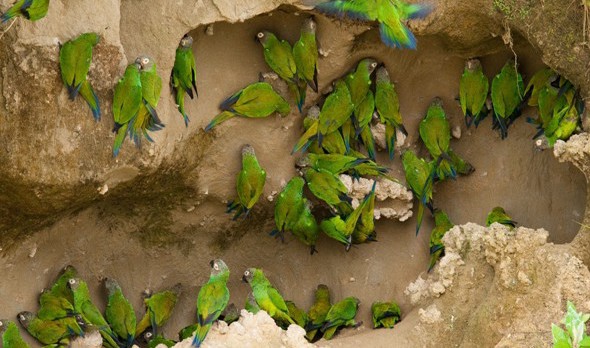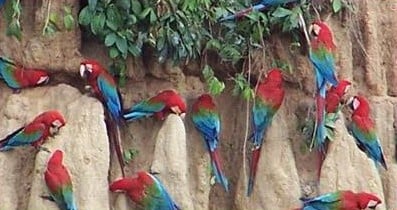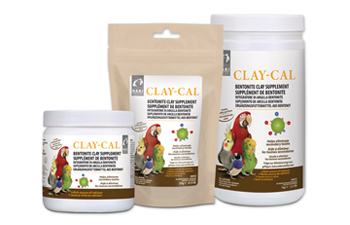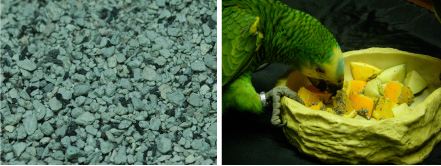
Geophagia & Clay-Cal Bentonite Supplement
Do Our Companion Birds Need a “DETOX”?
With the captive lifestyle one would think no…after all, as avian caretakers, we offer great diet, optimal environment, protection from those poisonous plants and substances-a lifestyle very different from our birds’ wild counterparts. So let’s look at this a little closer…
First the definition of Geophagia
 The consumption of soil or clay for diet benefit. In the wild, parrots instinctively flock to clay licks. It is believed by many field researchers that birds do this to detoxify their digestive systems after consuming toxic plants or food sources…and to add missing nutrients to their diet.
The consumption of soil or clay for diet benefit. In the wild, parrots instinctively flock to clay licks. It is believed by many field researchers that birds do this to detoxify their digestive systems after consuming toxic plants or food sources…and to add missing nutrients to their diet.
Without a doubt, most of the avian community is aware of the geophagia activities of wild parrots at the Manu Cliffs in Peru. Several species of parrots, in addition to other animal species, have been observed consuming the clays at the well known Manu Cliff as well as clay licks found all over the world. Several hypotheses have been proposed to explain the existence of geophagy. It is believed that clay consumption by the wild parrot population provides supplemental minerals such as calcium that may be lacking in the routine diet as well as providing the means to eliminate their digestive systems of dietary toxins.
How does Geophagia, or rather, the need for our Clay-Cal fit in with our companion birds?
 Well, Clay-Cal is a clay product that combines the detoxifying benefits of Bentonite Clay and charcoal with calcium for nutrient supplement.
Well, Clay-Cal is a clay product that combines the detoxifying benefits of Bentonite Clay and charcoal with calcium for nutrient supplement.
One of the primary benefits of bentonite clay, specifically montmorillonite clay-with superior levels of cation exchange capacity (ability of absorb toxins), is its effect on countering dietary toxins by binding mycotoxins or fungal toxins, endotoxins, manmade toxic chemicals and bacteria. Because of the clay’s ability to act as an antacid, Clay-Cal can protect the gut lining from corrosion. This alone improves food intake as it protects the GI tract from chemical and biological irritation. At HARI, our birds are regularly supplied with fresh tree branches for perching, chewing and shredding activities. And while the wood source is perfectly safe, some of the tannins found in the wood bark can contain secondary compounds toxins. Clay-Cal helps our birds deal with these possible toxins found in the branches. Clay-Cal elevated PH level plays a critical role in the bird’s ability to remain healthy and resist disease.
What other possible toxins are companion birds exposed to?
Well, there are multiple household chemicals that come from floors, carpets, cleansing agents for example. In addition, think about the possible pesticides and additives found on fresh fruits and vegetables. How about genetically modified food items? Clay-Cal won’t undo a down and out toxic exposure-but will help your birds deal with the casual exposure that often goes undetected in everyday life.

Let’s not forget the Calcium benefits as well. Clay-Cal also supplements the calcium needs for healthy bone development. And, how about those chronic egg layers? Typically, in the past, we’ve offered our companion birds, especially the passerines, grit, which has some calcium benefit. The negative aspect of grit includes crop impaction as the grit morsel does not break down. This is especially dangerous with birds displaying pica behavior. (Pica-overconsumption or craving for food or non-food item as a result of deficiency or undesirable internal condition). Clay-Cal can be safely given to birds and pica behavior observations should be an indication to the avian caretaker to seek avian veterinarian advice.
Clay-Cal is not a substitute for proper avian medical advice.



